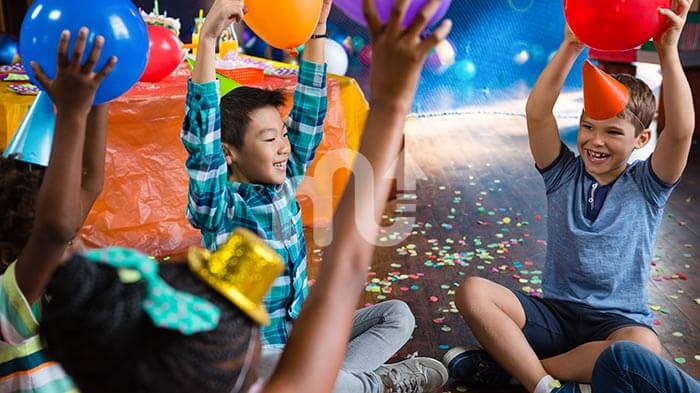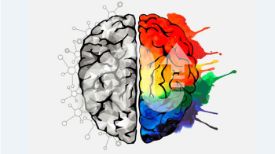What Are Social Emotional Skills? How Can You Improve Them?
Because babies cry and use their emotions, usually to get attention or help, this can be classified as social interaction. However, as the baby grows, it needs to balance needs, emotions, and social interactions.
At that point, parents should be guiding their children in developing their social emotional skills to reach a balanced adult life.
Social Emotional Skills Definition
OECD.org defines social emotional skills as “the set of abilities that regulate our thoughts, emotions, and behaviour.” Those skills are generally categorised differently from other cognitive abilities such as verbal or mathematical skills that indicate our ability to process information.
However, as cognitive abilities, social emotional skills are also responsive to change, dependent on situational or environmental factors and can be developed through a series of learning experiences. They affect how we manage our emotions and engage with the outside world. They also have serious personal and social outcomes.
Skills acquired in childhood affect our social and emotional intelligence! Read this section to help your child improve their social emotional intelligence:
Even though being a good communicator depends on the development of social emotional skills, supporting these skills with other types of intelligence is the key to a healthier development.
Improving different intelligence skills as a whole enables children to achieve long-term success. Don't underestimate games (problem-solving exercises or board games), which are the most effective way to improve children's mental skills.
MentalUP, a pedagogically-designed brain games app, supports everything from children's attention and memory development to the development of logic and visual and verbal intelligence with its fun ice breaker games for kids.
Types of Social Emotional Skills and Behaviours
Social emotional skills develop in line with personality. That’s why it would be better to recall the well-known Big Five Theory on personality traits while talking about the types of social emotional skills.
In agreement with many personality psychologists, Verywellmind.com defines the broad categories of the Big Five as follows:
- Openness to experience (open-mindedness)
- Conscientiousness (task performance)
- Emotional stability (emotional regulation)
- Extraversion (engaging with others)
- Agreeableness (collaboration)
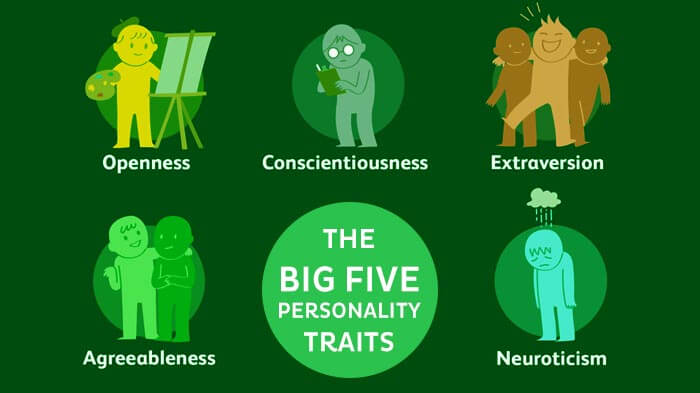
In the OECD’s study on social emotional skills, which is based on their international survey assessing 10 and 15-year-old students, it is estimated that there are 15 social emotional skills around The Big Five traits with an additional compound skill.
These skills can be listed and defined as below;
- Achievement orientation: Setting high standards and working hard to meet them.
- Responsibility: Ability to honor commitments, and be punctual and reliable.
- Self-control: Ability to avoid distractions and focus attention on the current task in order to achieve personal goals.
- Persistence: Perseverence in tasks and activities until they are finished.
- Stress resistance: Effectiveness in modulating anxiety and ability to calmly solve problems (being relaxed, handling stress well).
- Optimism: Positive and optimistic expectations for self and life in general.
- Emotional control: Effective strategies for regulating temper, anger, and irritation in the face of frustrations.
- Empathy: Kindness and caring for others and their well-being that leads to valuing and investing in close relationships.
- Trust: Assuming that others generally have good intentions and forgiving those who have done wrong.
- Cooperation: Living in harmony with others and valuing interconnectedness among all people.
- Curiosity: Interest in ideas and love of learning, understanding, and intellectual exploration; an inquisitive mindset.
- Tolerance: Openness to different points of view, valuing diversity, and appreciating foreign people and cultures.
- Creativity: Generating novel ways to do or think about things through exploring, learning from failure, insight, and vision.
- Sociability: Ability to approach others, both friends and strangers, initiating and maintaining social emotional connections.
- Assertiveness: Ability to confidently voice opinions, needs, and feelings, and exert social emotional influence.
- Energy: Approaching daily life with energy, excitement, and spontaneity.
- Self-efficacy: Strong belief in personal ability to execute tasks and achieve goals.
- Critical thinking / Independence: Ability to evaluate information and interpret it through independent and unconstrained analysis.
- Self-reflection/ Meta-cognition: Awareness of inner processes and subjective experiences such as thoughts and feelings, and the ability to reflect on and articulate such experiences.
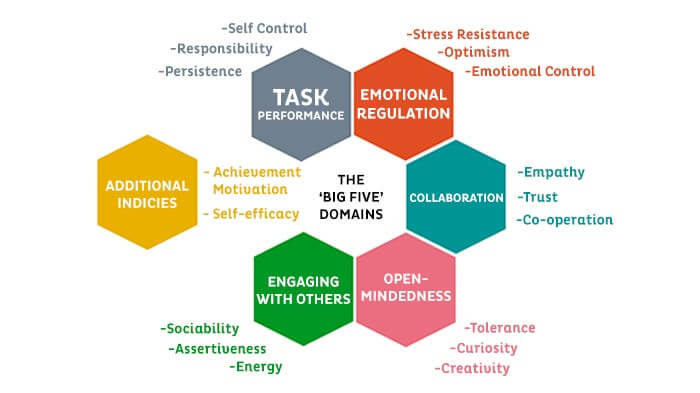
Social Emotional Learning
Social emotional learning (SEL) is an important process especially for kids because it can help boost children's success. Social emotional learning is said to increase success by an average of 11 points. This is due to the development of prosocial behavior such as kindness, sharing and empathy.
Social emotional learning also improves students' attitudes towards school and reduces depression and stress among students. An effective social emotional learning programme includes a coordinated classroom, school, family and community practices that help students develop the following five core skills:
1- Self-Awareness: It is the ability to perceive one's own feelings, thoughts, and accurately recognize how they affect their own values and behavior.
2- Self-Management: It is the ability to successfully organize emotions, thoughts and behaviors. For example, the ability to set personal and academic goals, and work towards them.
3- Social Awareness: The ability to understand, take and empathize with others' perspectives, including those with different cultures and cultivation environments.
4- Relationship Skills: The ability to establish and maintain mutually healthy and rewarding relationships with different individuals and groups.
5- Responsible Decision-Making: To be able to make constructive choices about ethical behaviours, decisions regarding security concerns, personal behaviour based on social norms and social interactions.
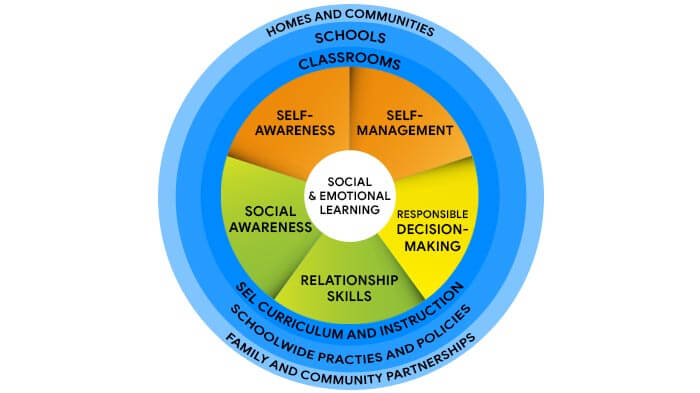
How to Improve Kids’ Social Emotional Development
We are all social emotional beings and throughout our lives, we all continue to shape our behaviours and relationships. However, for lifelong well-being, the development of social emotional skills should be shaped wisely as a child opens its eyes to this world.
Early ages are especially important for kids as they explore the world and every concept related to it. They are so eager to learn new things and they shape a future with what they have learnt in their childhood.
Here are some strategic actions that will help you guide your child in improving their social emotional learning skills:
- Define and verbalise your children’s emotions: If they are crying, tell them “You look sad” or “It looks like you are mad right now.” This way you can reflect their emotions to them with words and help them understand and verbalise them too.
- Approve your children’s feelings: Instead of saying “Stop shouting and calm down, it’s not a big deal” try to say “I know you are really angry right now but we can talk about it.” This way you can show them that it’s sometimes okay to have big feelings.
- Try to build some empathy together: Ask them “Can you show me how your friend’s face was when you hit him?” This way they will learn to show empathy in regards to what others could have felt.
- Give your kid some space and let them experience uncomfortable feelings: Everyone feels alone or bored sometimes. Teach them how to handle those feelings instead of avoiding them. This will help them tolerate disturbing feelings and situations going forward.
- Accept emotions & correct behaviours: It’s okay to feel angry sometimes. Eventually, we need to feel that anger in some specific situations. However, it is never acceptable to show aggressive behaviours. Teach your children that the feeling is normal, but they shouldn’t be screaming loudly in a public area just because they are feeling an emotion as this may make other people uncomfortable.
- Support other cognitive skills: Improving verbal and mathematical skills will also support children’s social emotional development, as they affect communication and reasoning abilities. Scientific educational brain games apps developed by academicians like those at MentalUP are reliable and beneficial sources to improve cognitive skills. MentalUP first determines children’s abilities and gives daily challenges to support improvable skills.
Every parent should keep in mind that all kids can shape and develop their social and emotional skills differently. Trying to find ways that suit your kids’ needs, interests and according to learning styles (such as visual, sensory, cognitive or auditory learning style) is always a better solution than blaming yourself or the kids.


